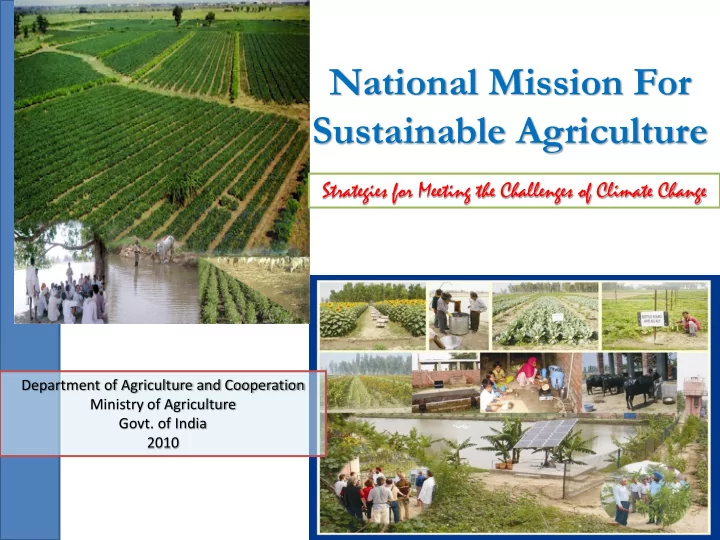

National Mission For Sustainable Agriculture Strategies for Meeting the Challenges of Climate Change Department of Agriculture and Cooperation Ministry of Agriculture Govt. of India 2010
National Mission For Sustainable Agriculture Climate change is no more an environmental concern. It has emerged as the biggest developmental challenge for the planet. ( UNDP 2009) 2
Interplay National Mission For Sustainable Agriculture Food System Climatic Farm or Cropping Variability System and Extreme Risks Events Crop and Livestock Agriculture sector being closely tied to natural resource base is more vulnerable to climate change (NAPCC) 3
Risks on Agriculture National Mission For Sustainable Agriculture • Lower Productivity Crops • Poor quality of Produce Affects Livelihood Agrarian Food Soil and • Degradation and Security Water Distress Depletion and Resources Economy • Additional Heat Livestock Stress and • Impact on Fisheries Aquatic Habitat 4
Risks From Agriculture National Mission For Sustainable Agriculture • 17.6% of total GHG is from Agriculture • 63.4% contributed by Livestocks and 20.9% by Rice Cultivation 5 Million Tonnes of CO2 Equivalent Source: MoEF, 2010
Climate Change Projections National Mission For Sustainable Agriculture • Climatic Variability and Extreme Events – Temperature Rise: 0.2 degree Centigrade per decade – Mean Summer Rainfall to increase – Frequent and Longer dry spells – Shorter but Heavier Precipitation Events – Hot Extremes, Heat Waves to be more common – Contraction of Snow Cover – Rise in Sea Levels IPCC-2007 • Degradation of Natural Resources (Land/Water/Bio- diversity) 6
Impacts National Mission For Sustainable Agriculture Reduction of Agriculture Yields in Long Term: Upto 40% by 2100 (NAPCC) If no adaptation and mitigation measures are taken 7
Conceptualizing NMSA National Mission For Sustainable Agriculture Beginning the • Brain-Storming Session Process chaired by Hon’ble AM Formulation of • Stakeholders Ministries Approach Paper and Departments Consultations • Knowledge Institutions (TERI, ICRISAT, CRIDA) Preliminary Draft • State Governments Document • Dr. K Kasturirangan • Dr. M S Swaminathan Expert Review Final Draft • Prof. Abhijit Sen Document • Dr. G S Kalkat 8
Vision Contribute to Economic Stability at the National National Mission For Sustainable Agriculture Level Ensure Food Security and Equitable Access to Food Resources Transform Grow and Ecologically Agriculture into Sustain agricultural Climate Resilient production to its Fullest Production system Potential Enhance Livelihood Opportunities 9
Focus • To realize the enormous agricultural growth potential National Mission For Sustainable Agriculture Dryland Farming of the drylands and secure farm-based livelihoods through customized crop varieties and practices • To contextualize action plans to regional scales for Strategic Planning at Agro Climatic Zone improving efficiency and effectiveness in R&D, Level Technology, Product & Practices, Capacity building • Use of Bio Technology, Management of heat stress in Customized interventions to livestock, Improving water use efficiency, Soil enhance productivity conservation, Capacity building • Access to information, Risk Management, Market Easy access to Information and Infrastructure • Institutional Linkages with stakeholders, civil society Institutional Support • Model Village and Farm Units Linking Laboratory to • Establishing Linkages between Research, Industry and Land Farmers
Approach Research and Development National Mission For Sustainable Agriculture Technology, Products and Practices Infrastructure Capacity Building Functional Areas Dimensions 11
Functional Areas • Biotechnology, Drought resistant Crops Research and • Livestock Development • Research on Dryland Agriculture Technology, • Resource Conservation Technology Product and • Agricultural Mechanization Practices • Integrated Farming • Financial Infrastructure (Insurance, Credit) Infrastructure • Market Infrastructure • Information Network Capacity • Farmer-Industry-Institution Linkage Building • Knowledge Management 12
Programme of Action National Mission For Sustainable Agriculture Mainstreaming adaptation and mitigation measures in ongoing Interventions through upscaling and course-correction Introduction of new programmatic interventions Policy Instruments and Convergence 13
• Agricultural inputs, Farm mechanization, Organic Farming , Micro Irrigation Mainstreaming, (NHM, NFSM, RKVY, NPMSF) National Mission For Sustainable Agriculture Embedding and • Research on Crop, Livestock, Agriculture Census Upscaling (NAIP, FFDS, NPCBB) • Markets, Insurance, Credit (TMC, WBCIS, NAIS, KCC) • Extension (RKVY, ATMA, KVK) • Agricultural Intelligence System • Market research (Production-Retail chain) • Resource Conservation Technologies New (RCT) Interventions • Management of feeding schedule for livestock • Web based digitized climatic information and forecasting system 14
• Crop insurance • Financial incentives for Resource National Mission For Sustainable Agriculture Policy Conservation Instruments • Water policies and pricing • Agriculture Power, Renewable Energy • Agro-Forestry- National Mission for a “Green India” • Water Pricing, Water Efficiency- National Water Mission • Energy Pricing for Irrigation, Energy Convergence Efficiency- National Mission for Enhanced Energy Efficiency • Knowledge Management- National Mission on Strategic Knowledge for Climate Change 15
Institutional Framework National Mission For Sustainable Agriculture National Level Central and State Governments Co-Ordination Knowledge Institutions, Stakeholder Inter- Ministries (Min. of Water Resources; Ministerial Power; Environment and Forest; Rural Co-Ordination Development; Earth Sciences; Science and Technology, Finance, etc.) Dept. of Agriculture & Cooperation, Intra- Animal Husbandry & Dairying, Ministerial Agricultural Research & Education, Co-Ordination NGO’s, Civil Society, Private Partners and Other Stakeholders 16
Financial Implication Capacity National Mission For Sustainable Agriculture Research and Building Development (5%) (6%) Technology, Infrastructure Product and (29%) Practices (60%) Rs. 1,08,000 Crores in form additional budgetary support 17 (Upto 2016-17 at current prices)
Outcome Scenario 2020: Foodgrain Demand- 281 Million Tonnes • Climate Change impacts Food Grains Worst Case Productions and ‘No Adaptation & Mitigation Measures’ are taken Scenario • Food Grain Production: 261 Million Tonnes ( Shortfall: 20 Million Tonnes) • Climate Change impacts agriculture but Optimum ‘Adaptation and Mitigation Measures’ are implemented Scenario • Food Grain Production: 281 Million Tonnes ( Shortfall: NIL) Best Case • Food grain production surpasses target Scenario and reaches 301 Million Tonnes (Excess: 20 Million Tonnes) 18
Summing Up National Mission For Sustainable Agriculture Economic Stability Food Security Equitable Access to Food Ecologically Sustainable Agricultural Livelihood Opportunities Growth through progressive Adaptation and Mitigation 19
National Mission For Sustainable Agriculture Thanks 20
Recommend
More recommend